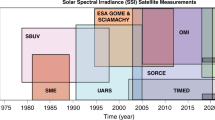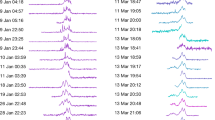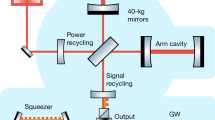Abstract
RADIO-FREQUENCY radiation in the ten-metre range of wave-lengths which appeared to originate in the region of the Milky Way was reported by Jansky1 in 1933. He observed no measurable effect from the sun, despite the fact that its thermal radiation immensely exceeds the total from all other stars, and deduced that this 'cosmic static' originated in interstellar space. Later observers, Reber2 (2 metres), English Army observers3 (5 metres) and Royal New Zealand Air Force radar personnel4 (1.5 metres), have since reported small or large effects from the sun itself.
This is a preview of subscription content, access via your institution
Access options
Subscribe to this journal
Receive 51 print issues and online access
$199.00 per year
only $3.90 per issue
Buy this article
- Purchase on Springer Link
- Instant access to full article PDF
Prices may be subject to local taxes which are calculated during checkout
Similar content being viewed by others
References
Jansky, Proc. Inst. Radio Eng., 21, 1387 (1933).
Reber, Astrophys. J., 279 (Nov. 1944).
Army Operational Research Group (British). Report No. 275. (Restricted report.)
Alexander, Radio Development Laboratory Report No. RD. 1/518. (D.S.I.R., New Zealand.) (Restricted report.)
Author information
Authors and Affiliations
Rights and permissions
About this article
Cite this article
PAWSEY, J., PAYNE-SOOTT, R. & McCREADY, L. Radio-Frequency Energy from the Sun. Nature 157, 158–159 (1946). https://doi.org/10.1038/157158a0
Issue Date:
DOI: https://doi.org/10.1038/157158a0
This article is cited by
-
Recalibration of the Sunspot-Number: Status Report
Solar Physics (2023)
-
First Solar Radio Burst Observations by the Mexican Array Radio Telescope (MEXART) at 140 MHz
Solar Physics (2022)
-
A space-based decametric wavelength radio telescope concept
Experimental Astronomy (2018)
Comments
By submitting a comment you agree to abide by our Terms and Community Guidelines. If you find something abusive or that does not comply with our terms or guidelines please flag it as inappropriate.



